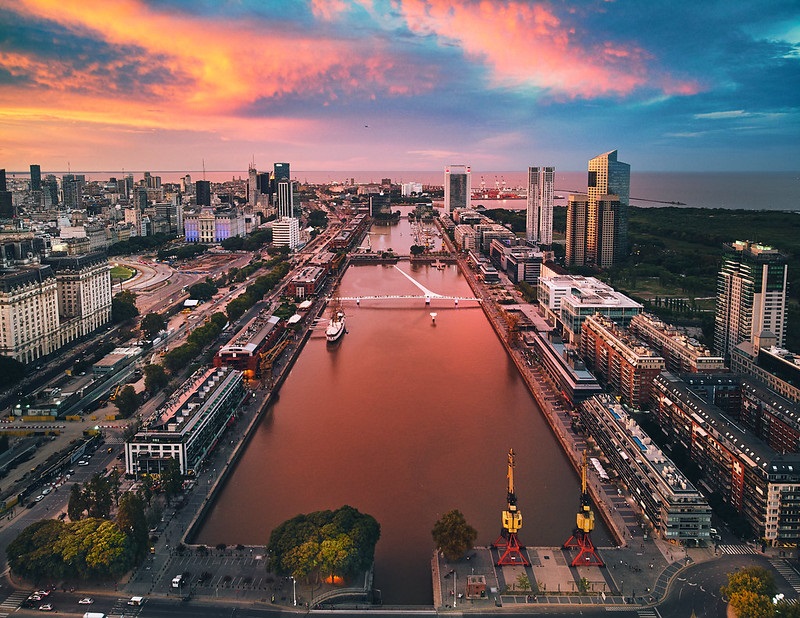RIO DE JANEIRO, BRAZIL – The Minister of Economy of Argentina, Martin Guzman, said Thursday that the South American country is “living a solid process of economic recovery” and updated to 8% the projection of gross domestic product (GDP) growth for this year.
In the virtual conference of the 18th edition of the Council of the Americas, Guzmán indicated that the recovery has “heterogeneous characteristics”, but “with a clear projection of vigorous growth” for 2021.
Read also: Check out our coverage on Argentina
Affected by the covid-19 pandemic, Argentina’s GDP fell 9.9% in 2020, deepening the recession that started in 2018.
For 2021, the government of Alberto Fernández had projected in the Budget for this year an economic recovery of 5.5%, which was later updated to 7% by his officials.

Guzmán added this Thursday that a 38.4% year-on-year investment growth is observed in real terms in the first quarter and on the external front by pointing out the rise in international reserves and exports.
IMF DEBT
Argentina continues “solving the problems of unsustainable debts”, added Guzmán, after the country restructured its debt with private creditors in 2020, on the principle that “there are shared responsibilities between creditors and debtors, and with that logic, these problems must be solved.”
Fernández’s administration has kept open since last year, negotiations with the IMF to refinance debts for US$45.52 billion contracted in a bailout pact signed in 2018, during the government of Mauricio Macri (2015-2019).
“Understanding that there was a shared responsibility in what was the record indebtedness with the IMF is that we seek to solve this problem, based on a negotiation that gives rise to conditions that Argentina can sustain,” said the minister in this forum in which other members of the Argentine government, as well as opposition political leaders, participated.
The Argentine government intends to reach an extended facilities agreement with the IMF, with lower interest rates and payment terms of at least 10 years.
LIMITATIONS
The president of the Central Bank, Miguel Pesce, added that the country is working “intensely” with the IMF “to seek an agreement mechanism” on debt maturities “especially” for the next two years.
“We hope that we can reach an acceptable agreement for Argentina and also understand the limitations that the IMF’s charter has to address situations such as the one presented to Argentina, which is the organization’s largest debtor,” Pesce said.
Regarding the restrictions on access to the foreign exchange market, Pesce said: “As long as we can export more, as long as this export drive continues, we will surely continue reducing our foreign exchange restrictions so that at some point, hopefully as soon as possible, we will not need this kind of controls.”
INVESTMENTS
The Argentine Foreign Minister, Felipe Solá, recalled that Argentina needs productive investments and that the U.S. is the first investor. “We see the U.S. as a vital ally of Argentina’s economic recovery,” said Solá.
The Chancellor explained that the objectives of his portfolio are to promote genuine foreign currency income through exports, to take a path of productive and commercial social integration and political dialogue with the whole region, with a focus on Argentina’s membership in Mercosur and Celac.
ROLE OF THE OPPOSITION
The conference, organized by the Argentine Chamber of Commerce and Services (CAC) and the Americas Society/Council of the Americas, was also attended by candidates of the opposition and the ruling party, in view of next September’s primary elections for the legislative elections to be held in November.
One of the opposition representatives was the mayor of the city of Buenos Aires, Horacio Rodríguez Larreta, who recalled that Argentina “is still facing the same frustrations as 50 years ago,” regarding inflation, economic and educational deterioration, permanent change of the rules of the game, lack of federalism and constant fights between political actors.
“To move forward, Argentina needs to have once and for all a long term plan, serious and agreed by all or most of the political forces,” he said, and pointed out that such plan is based on the pillars of education, work, an intelligent and facilitating State and respect for the institutions and the rejection of privileges.

